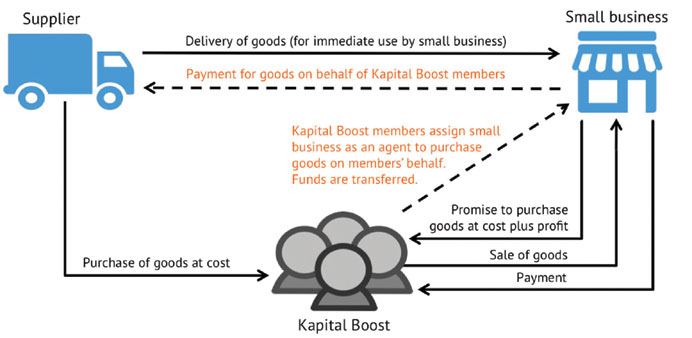By Arno Maierbrugger
Gulf Times Correspondent Bangkok
Alternative financing and non-bank funding are no more strangers to Islamic finance since the concept of Islamic crowdfunding gained ground in the sector.
One of the best examples is Singapore-based Shariah-compliant crowdfunding platform Kapital Boost. It is the first Islamic peer-to-business crowdfunding platform in Asia, launched in July 2015, and has so far funded eight small and medium enterprises (SMEs) across Singapore and Indonesia and immediately won the Social Enterprise Startup of the Year award during the inaugural Asean Rice Bowl Startup event held in Kuala Lumpur this November.
“Our crowdfunding platform levels the playing field by providing liquidity for goods and capital purchases for SMEs. In return, these deals give our crowdfunding community potentially high, short-term returns. Our crowdfunding investments are ethical and follow Shariah principles to protect socio-economic welfare,” says Kapital Boost co-founder and managing partner Erly Witoyo.
He points out the importance of alternative SME financing in the region, noting that in Southeast Asia, SME loans as a percentage of total bank loans have gradually declined to 19% from 23% in 2007 although SMEs comprise around 95% of total businesses in the region and generate over 60% of total employment.
“We now hope that the award will give us the impetus to grow faster and make a bigger impact on SMEs in the region,” Witoyo added, saying that his platform is currently focusing on Indonesia, Malaysia and Singapore but could be extended to other countries in the region.
Kapital Boost’s business is based on Murabaha, or an asset purchase arrangement in accordance with Islamic financing principles. A group of investors through the platform purchases an asset – for instance, raw materials, trade goods, a manufacturing machine or a delivery truck – and enters an agreement with the SME to sell it to them at a mark-up price sometime in the future while in the meantime the SME can use the goods for its business. For investors, the profit turnaround is between 90 and 270 days, the company emphasises. Returns are expected to be between 4.5% and 10% from the financing rounds closed so far.
Kapital Boost also aims at helping SEMs grow by shortening their cash conversion cycles and by offering competitive rates coupled with a fast approval process versus other non-bank financing.
That way, the company addresses two problems in the region: Firstly, the lack of funding options for SMEs in Southeast Asia in general, and, secondly, the shortage of attractive Islamic-based investments especially for small investors.
Among the deals competed by Kapital Boost so far were financing for businesses involving Batik textile trade, e-commerce with mobile phone cases, revamping of a socially responsible boutique café in Singapore, purchase of mobile phone display boxes, and, as the latest deal, a Singapore-based halal meat manufacturer which was seeking investors to purchase S$100,000 worth of cattle.
The Kapital Boost team believes that Islamic crowdfunding has the potential to become “a real game-changer” in the financial world as it allowed “the building of communities and promotes ethical and social responsibility which are critical aspects of the Islamic worldview” and the “empowerment of Muslims to create an ecosystem based on their own value-system independent of capitalist Corps or bureaucratic governments.”
Islamic crowdfunding in general took off around two years ago and prompted the launch of innovative platforms active in various sub-segments of the sector.
In Malaysia, Shariah-compliant crowdfunding platforms include Make the Pitch, myStartr, pitchIN and Social Sharity; in Indonesia, there are BursaIde, Pantugan, Wujudkan and Blossom; in Singapore, apart from Kapital Boost, there is Club Ethis, an Islamic crowdfunding platform focusing on real estate finance; in Pakistan Seedout; in Lebanon Zoomal; in the UAE Aflamnah, Eureeca, Beehive and Goodgate; in Qatar Narwi; in Egypt Shekra and Yomken; and in Turkey Biayda and FonlaBeni. Shariah-compliant platforms outside of the Muslim world are US-based LaunchGood and HalalSky, as well as HalalFunder and CrowdCube in the UK.

